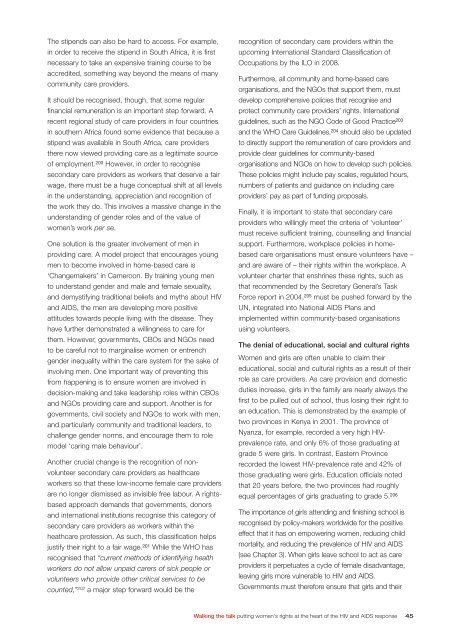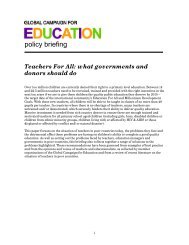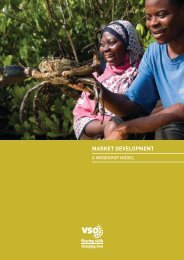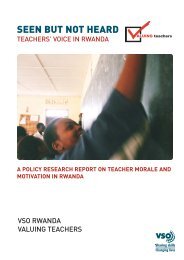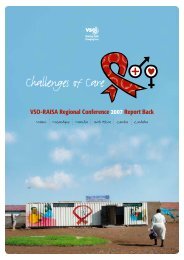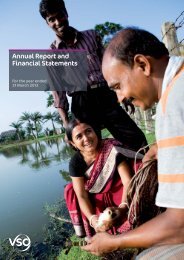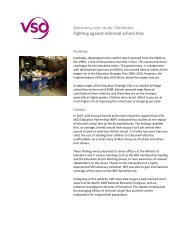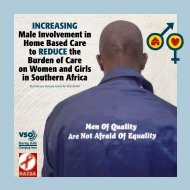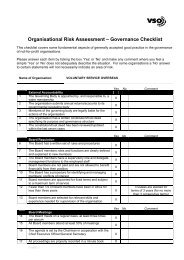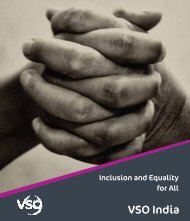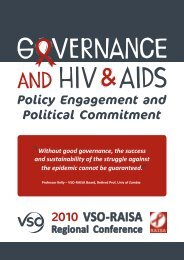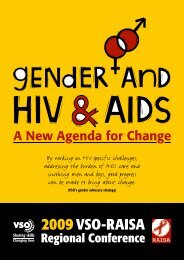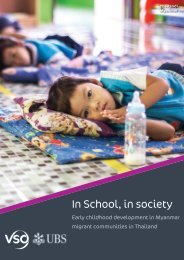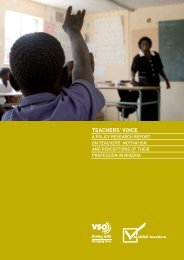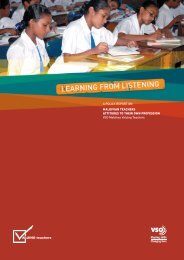Walking the Talk - VSO
Walking the Talk - VSO
Walking the Talk - VSO
Create successful ePaper yourself
Turn your PDF publications into a flip-book with our unique Google optimized e-Paper software.
The stipends can also be hard to access. For example,in order to receive <strong>the</strong> stipend in South Africa, it is firstnecessary to take an expensive training course to beaccredited, something way beyond <strong>the</strong> means of manycommunity care providers.It should be recognised, though, that some regularfinancial remuneration is an important step forward. Arecent regional study of care providers in four countriesin sou<strong>the</strong>rn Africa found some evidence that because astipend was available in South Africa, care providers<strong>the</strong>re now viewed providing care as a legitimate sourceof employment. 200 However, in order to recognisesecondary care providers as workers that deserve a fairwage, <strong>the</strong>re must be a huge conceptual shift at all levelsin <strong>the</strong> understanding, appreciation and recognition of<strong>the</strong> work <strong>the</strong>y do. This involves a massive change in <strong>the</strong>understanding of gender roles and of <strong>the</strong> value ofwomen’s work per se.One solution is <strong>the</strong> greater involvement of men inproviding care. A model project that encourages youngmen to become involved in home-based care is‘Changemakers’ in Cameroon. By training young mento understand gender and male and female sexuality,and demystifying traditional beliefs and myths about HIVand AIDS, <strong>the</strong> men are developing more positiveattitudes towards people living with <strong>the</strong> disease. Theyhave fur<strong>the</strong>r demonstrated a willingness to care for<strong>the</strong>m. However, governments, CBOs and NGOs needto be careful not to marginalise women or entrenchgender inequality within <strong>the</strong> care system for <strong>the</strong> sake ofinvolving men. One important way of preventing thisfrom happening is to ensure women are involved indecision-making and take leadership roles within CBOsand NGOs providing care and support. Ano<strong>the</strong>r is forgovernments, civil society and NGOs to work with men,and particularly community and traditional leaders, tochallenge gender norms, and encourage <strong>the</strong>m to rolemodel ‘caring male behaviour’.Ano<strong>the</strong>r crucial change is <strong>the</strong> recognition of nonvolunteersecondary care providers as healthcareworkers so that <strong>the</strong>se low-income female care providersare no longer dismissed as invisible free labour. A rightsbasedapproach demands that governments, donorsand international institutions recognise this category ofsecondary care providers as workers within <strong>the</strong>heathcare profession. As such, this classification helpsjustify <strong>the</strong>ir right to a fair wage. 201 While <strong>the</strong> WHO hasrecognised that “current methods of identifying healthworkers do not allow unpaid carers of sick people orvolunteers who provide o<strong>the</strong>r critical services to becounted,” 202 a major step forward would be <strong>the</strong>recognition of secondary care providers within <strong>the</strong>upcoming International Standard Classification ofOccupations by <strong>the</strong> ILO in 2008.Fur<strong>the</strong>rmore, all community and home-based careorganisations, and <strong>the</strong> NGOs that support <strong>the</strong>m, mustdevelop comprehensive policies that recognise andprotect community care providers’ rights. Internationalguidelines, such as <strong>the</strong> NGO Code of Good Practice 203and <strong>the</strong> WHO Care Guidelines, 204 should also be updatedto directly support <strong>the</strong> remuneration of care providers andprovide clear guidelines for community-basedorganisations and NGOs on how to develop such policies.These policies might include pay scales, regulated hours,numbers of patients and guidance on including careproviders’ pay as part of funding proposals.Finally, it is important to state that secondary careproviders who willingly meet <strong>the</strong> criteria of ‘volunteer’must receive sufficient training, counselling and financialsupport. Fur<strong>the</strong>rmore, workplace policies in homebasedcare organisations must ensure volunteers have –and are aware of – <strong>the</strong>ir rights within <strong>the</strong> workplace. Avolunteer charter that enshrines <strong>the</strong>se rights, such asthat recommended by <strong>the</strong> Secretary General’s TaskForce report in 2004, 205 must be pushed forward by <strong>the</strong>UN, integrated into National AIDS Plans andimplemented within community-based organisationsusing volunteers.The denial of educational, social and cultural rightsWomen and girls are often unable to claim <strong>the</strong>ireducational, social and cultural rights as a result of <strong>the</strong>irrole as care providers. As care provision and domesticduties increase, girls in <strong>the</strong> family are nearly always <strong>the</strong>first to be pulled out of school, thus losing <strong>the</strong>ir right toan education. This is demonstrated by <strong>the</strong> example oftwo provinces in Kenya in 2001. The province ofNyanza, for example, recorded a very high HIVprevalencerate, and only 6% of those graduating atgrade 5 were girls. In contrast, Eastern Provincerecorded <strong>the</strong> lowest HIV-prevalence rate and 42% ofthose graduating were girls. Education officials notedthat 20 years before, <strong>the</strong> two provinces had roughlyequal percentages of girls graduating to grade 5. 206The importance of girls attending and finishing school isrecognised by policy-makers worldwide for <strong>the</strong> positiveeffect that it has on empowering women, reducing childmortality, and reducing <strong>the</strong> prevalence of HIV and AIDS(see Chapter 3). When girls leave school to act as careproviders it perpetuates a cycle of female disadvantage,leaving girls more vulnerable to HIV and AIDS.Governments must <strong>the</strong>refore ensure that girls and <strong>the</strong>ir<strong>Walking</strong> <strong>the</strong> talk putting women's rights at <strong>the</strong> heart of <strong>the</strong> HIV and AIDS response 45


